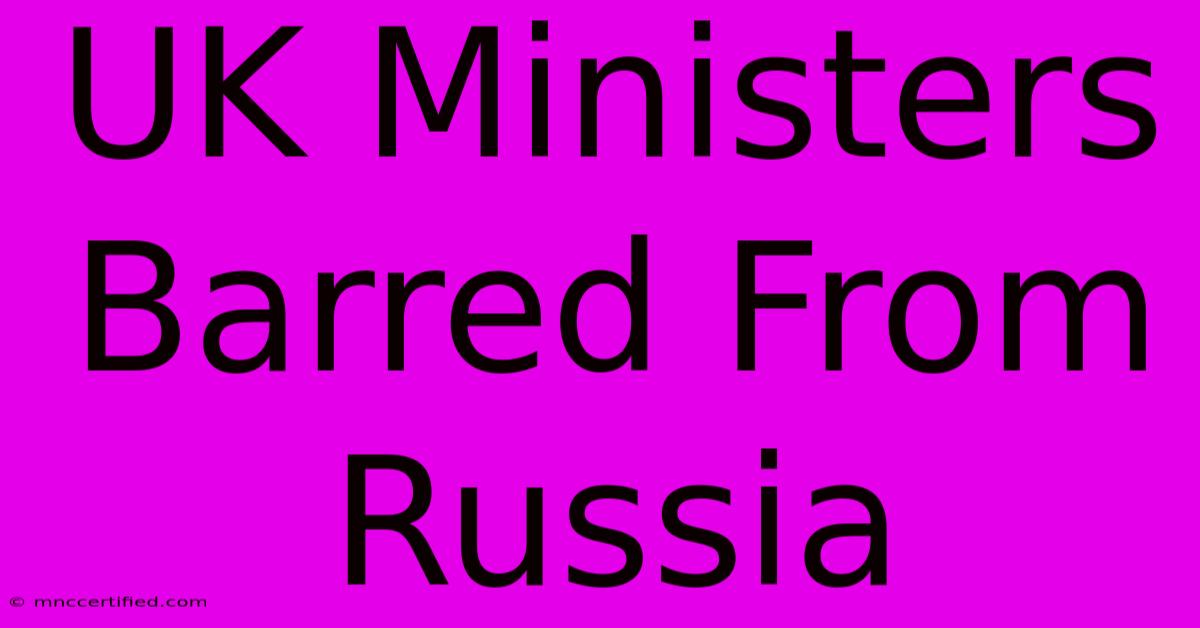UK Ministers Barred From Russia

Table of Contents
UK Ministers Barred From Russia: A Deep Dive into the Geopolitical Fallout
The UK's strained relationship with Russia has reached a new level of tension, with a significant number of UK ministers now barred from entering the country. This escalating situation is a direct consequence of the ongoing conflict in Ukraine and the UK's unwavering support for the embattled nation. This article delves into the reasons behind this ban, its implications, and the broader context of UK-Russia relations.
Understanding the Sanctions and the Ban
The ban on UK ministers entering Russia isn't a spontaneous act; it's a carefully calculated response within a wider framework of sanctions and retaliatory measures. Russia's actions are a clear demonstration of its displeasure with the UK's stance on the Ukraine conflict. These sanctions are not limited to travel bans; they encompass a range of economic and diplomatic penalties aimed at isolating Russia on the global stage. The UK's support for Ukraine, including providing military aid and imposing its own sanctions on Russian individuals and entities, has been a key trigger for this escalation.
Key Figures Affected: Who's on the List?
While the exact list of banned ministers remains somewhat fluid and isn't publicly released in its entirety by the Russian government, it's understood to include high-ranking officials within the UK government. This likely includes members of the Cabinet, particularly those directly involved in foreign policy and defense decisions. The lack of complete transparency from the Russian side adds to the uncertainty and tension surrounding the situation.
The Implications: Beyond Travel Restrictions
The impact of this ban extends far beyond the mere inconvenience of travel restrictions for affected ministers. It's a significant symbolic gesture, highlighting the deep chasm between the UK and Russia. This action signifies a breakdown in diplomatic relations and severely hinders any potential for direct dialogue or negotiation.
Damage to Diplomatic Relations: A Frozen Dialogue?
The ban essentially freezes any possibility of formal high-level discussions between the two countries. This severely limits the potential for resolving disagreements and addressing crucial international issues. The lack of open communication channels increases the risk of miscalculations and misunderstandings, escalating tensions further.
Impact on International Relations: A Wider Ripple Effect
The UK's ban on Russian ministers, coupled with Russia's reciprocal actions, sends shockwaves through the international community. It underscores the growing polarization in global politics and the increasing difficulty of maintaining constructive relationships amidst major geopolitical conflicts. Other nations are closely watching this situation, as it sets a precedent for future international relations.
Looking Ahead: Navigating the Complex Landscape
The future of UK-Russia relations remains uncertain and fraught with challenges. The current climate of mistrust and hostility makes finding common ground incredibly difficult. Effective diplomacy and international collaboration are essential to de-escalate the situation and prevent further deterioration of relations.
The Role of International Organizations: Mediation and Dialogue
International organizations like the United Nations and the European Union play a critical role in mediating disputes and fostering dialogue between hostile nations. Their efforts to promote peace and stability are crucial in navigating the complex dynamics of the UK-Russia relationship.
The Importance of Continued Support for Ukraine
The UK's unwavering support for Ukraine remains a cornerstone of its foreign policy. Continuing to provide aid and standing in solidarity with Ukraine is essential not only for humanitarian reasons but also as a crucial factor in shaping the geopolitical landscape and deterring further Russian aggression.
In conclusion, the ban on UK ministers entering Russia is a significant development in an already tense geopolitical climate. Its implications extend far beyond travel restrictions, impacting diplomatic relations and the broader international order. Finding a path toward de-escalation and restoring dialogue requires concerted effort from international actors and a commitment to diplomacy and peaceful conflict resolution. The situation serves as a stark reminder of the fragility of international relations and the urgent need for collaborative efforts to address global challenges.

Thank you for visiting our website wich cover about UK Ministers Barred From Russia. We hope the information provided has been useful to you. Feel free to contact us if you have any questions or need further assistance. See you next time and dont miss to bookmark.
Featured Posts
-
Erie Commercial Auto Insurance
Nov 27, 2024
-
Sporting Cp 1 5 Arsenal Analysis
Nov 27, 2024
-
First Mutual Insurance Company
Nov 27, 2024
-
Arizona De Insured Certificate
Nov 27, 2024
-
Walmart Dei Policy Under Review
Nov 27, 2024